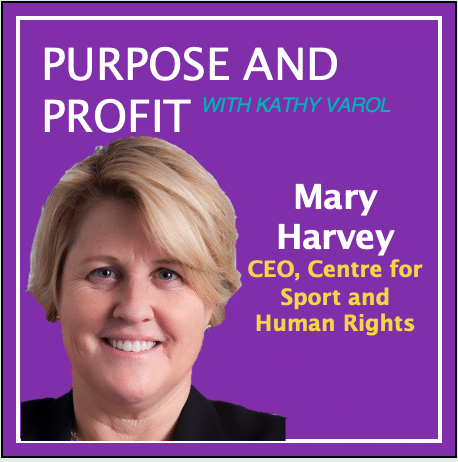Show Notes:
Mary Harvey is an accomplished sports governance and sustainability executive with 15+ years of leading worldwide initiatives to achieve societal change and gender equity through sports. As Chief Executive of the Centre for Sport and Human Rights, Mary oversees the Centre’s vision, including facilitating the deliberations of the Centre’s multi-stakeholder Advisory Council, operational and financial management, stakeholder engagement, and good governance.
Previously, as a FIFA executive Mary pushed for gender inclusion during a period of organizational reform. She also served as a sport envoy for the US State Department’s Sports Diplomacy Division, and as the Vice Chair of the Board of Directors of the Green Sports Alliance.
Mary’s work has improved the empowerment of girls and women, inclusion of marginalized groups, stewardship of the environment, and achievement of health and educational objectives.
A lifelong athlete, Mary enjoyed an 8-year career with the US Women’s National Soccer Team, winning the inaugural FIFA Women’s World Cup in 1991 and Olympic Gold in 1996.
In this episode we discuss:
✅ Why the protection of human rights is needed in sports
✅ The true heroes who are raising awareness of human rights violations in sports
✅ How businesses can help push for human rights reforms through sport
3 episode takeaways (listen to the full episode for a lot more gems!):
1️⃣ Awareness is where change starts. Simply put, we can’t fix problems we don’t know about. When we become aware of issues, like injustice or inequality, we begin to understand the need to address them. It’s like a lightbulb turning on, showing us where things are going wrong.
This understanding helps us take action to make things better. This is why whistleblowers are so important. Once we know about a problem and understand it, we can work together to find solutions and create a better world for everyone.
***
2️⃣The importance of truly understanding a problem before trying to fix it. While this is true in each area of life, it’s especially true when dealing with social problems like human rights abuses.
Social problems are complicated. As Mary mentions, you need to get input from every perspective, think very carefully about what you’re trying to do, who you’re trying to help, and what your collective understanding of a desired outcome is.
* * *
3️⃣ Every voice matters in the pursuit of human rights, especially for the most vulnerable among us. The movement to codify human rights in sports is new, but the truth is we need to look for how to protect human rights in every corner of society. It is not just a moral duty but an act of humanity to ensure that every individual, irrespective of their status, feels the protection of rights, respect, and dignity.
To successfully disrupt systems that allow for violations and abuses will require collective action and accountability. Every individual deserves an existence in which justice is not a privilege but a universal reality.
References:
- The Centre for Spot and Human Rights is developing a new series produced by BBC StoryWorks Commercial Production. The series will launch in 2024 and will feature documentary-style short films exploring critical issues on the sport and human rights agenda.
- Connect with Mary on LinkedIn
- Centre for Sport and Human Rights
- International Labour Organization (ILO)
- “For the Game. For the World.” FIFA and Human Rights by John G. Ruggie
- U.S. Center for SafeSport
- Council on Foreign Relations page on the kafala system
- Building and Wood Worker’s International (BWI)

